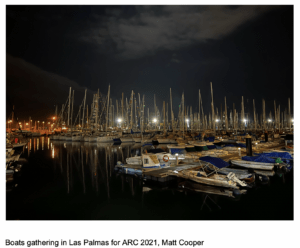
By DRONELIFE Staff Writer Ian M. Crosby
DJI has partnered with AnimaMundi Ocean Data Solutions and Lagoon to build the world’s first comprehensive database of plastic waste on coastlines using drones. The project starts with drones piloted by sailors taking place in the Atlantic Rally for Cruisers (ARC), which begins on Las Palmas in the Canary Islands on November 21st.
DJI is providing Lagoon with drones in order to measure plastic waste on beaches around the Caribbean. The drones will collect images for AnimaMundi’s automated processing to measure the scope of plastic waste pollution more efficiently. This data will offer evidence as to whether or not efforts to disrupt the flow of plastic into our oceans are resulting in a decrease in pollution on our coastlines.
With over 300 million tons of plastic produced each year, at least 8 million tons end up in our oceans, making up 80% of all marine debris, from surface waters to deep-sea sediment. However, there is currently no global data documenting the size, location, and evolution of the problem.
AnimaMundi has developed software that will automatically record, count, and register the presence and number of plastic bottles on our shores in real time, captured via an app using still photography and images from drones. The data is automatically uploaded, processed, and stored on the company’s servers and will be provided to those involved in ocean health projects, allowing for results-driven, measurable impact.
“Just before COP26 began, world leaders admitted that an annual $100-billion climate finance goal will not be reached until 2023,” said Matt Cooper, AnimaMundi’s founder and CEO. “The need for urgent climate action is met with the need to ensure adequate and effective financing solutions. Big data like this will help to determine priorities for action.”
Lagoon, the world leader in the sailing catamaran market and a partner of the ARC rally since 2005, uses its ‘Club Lagoon’ to encourage its owners to sign up to the program.
“Lagoon is proud to be partnering with AnimaMundi in this exciting data collection initiative using our ‘Club Lagoon’ as part of the solution,” said Lagoon Brand Director Thomas Gailly. “We have over 6000 of our catamarans sailing around the world and we can feel that our customers are more and more willing to play a role in such initiatives. It’s stimulating to think that the Lagoon owner’s community could be involved in capturing this much needed data in a highly efficient way. This partnership is the perfect complement to our own policy of respect for the environment and all the work undertaken to reduce the environmental impact of our activities.”
DJI, the global leader in civilian drones and aerial imaging technology, has provided the program with repurposed drones for use in capturing images of the Caribbean coastline that would otherwise be out of reach.
“Our drones and cameras empower people to capture amazing photos, video, and high-end professional imagery in every corner of the world,” said Olivier Mondon, Senior Communication Manager at DJI Europe. “Each day, we learn how drones benefit society as a whole, and we are proud to have our drones embark on this environmental journey with experienced sailors who will be able to work using repurposed products to enable invaluable data capture.”
Beginning with the Caribbean islands, AnimaMundi is additionally finalizing a partnership with the International Union for Conservation of Nature (IUCN) and its Plastic Waste-Free Islands (PWFI) initiative in order to generate weekly total island coastal plastic waste profiles covering Grenada, St Lucia, Antigua and Barbuda. With help from the Norwegian Agency for Development Cooperation, IUCN launched the PWFI project in the Caribbean, the Mediterranean, and Oceania in 2019, with the goal of promoting a circular economy and demonstrating effective, quantifiable solutions to address plastic leakage from Small Island Developing States.
Read more about using drones for ocean research, drones for pollution, and drones for plastic cleanup.
Miriam McNabb is the Editor-in-Chief of DRONELIFE and CEO of JobForDrones, a professional drone services marketplace, and a fascinated observer of the emerging drone industry and the regulatory environment for drones. Miriam has penned over 3,000 articles focused on the commercial drone space and is an international speaker and recognized figure in the industry. Miriam has a degree from the University of Chicago and over 20 years of experience in high tech sales and marketing for new technologies.
For drone industry consulting or writing, Email Miriam.
TWITTER:@spaldingbarker
Subscribe to DroneLife here.